Key takeaways:
- Embracing vulnerability in the face of setbacks fosters personal growth and resilience in rowing.
- Analyzing challenges and learning from both personal and team experiences can transform self-doubt into motivation.
- Implementing recovery strategies and reflecting on lessons learned are essential for continuous improvement in performance.
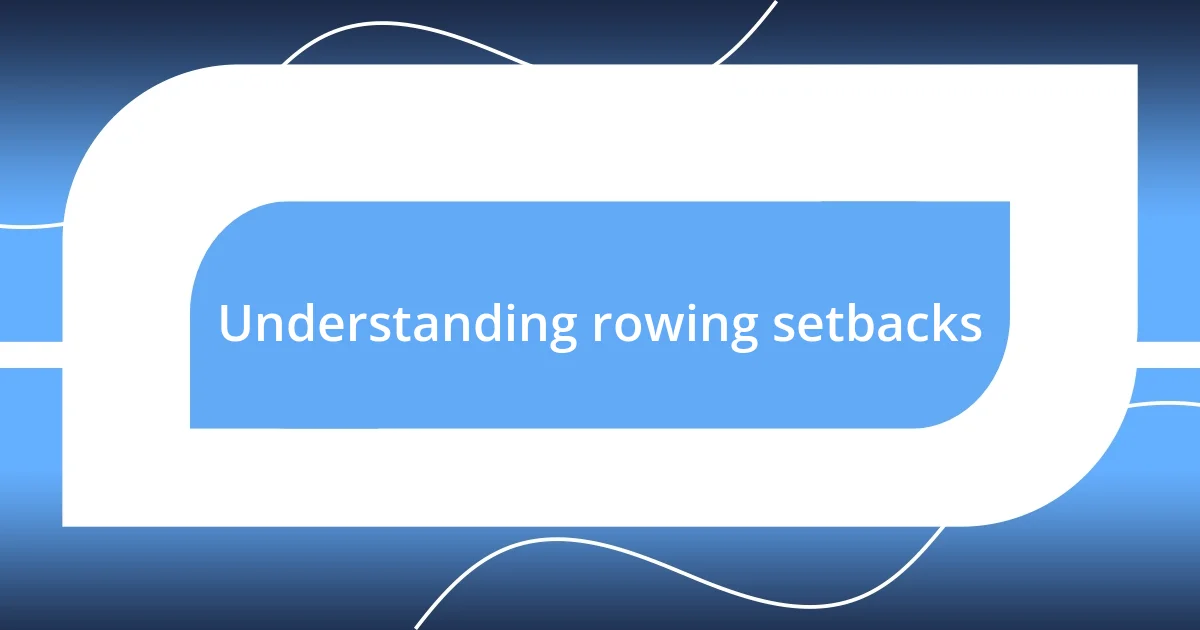
Understanding rowing setbacks
Rowing setbacks can be deeply frustrating, often hitting harder than we anticipate. I remember one practice where everything felt wrong; the boat just wouldn’t glide. It made me wonder, why can setbacks feel so personal in a team sport? The truth is, they challenge not only our physical ability but also our mental resilience.
I used to shy away from confronting these issues head-on, thinking that pushing through would make it all go away. However, I’ve learned that facing setbacks means embracing vulnerability. I recall a time when I struggled with maintaining rhythm in a race. Instead of ignoring my coach’s feedback out of embarrassment, I leaned into it, realizing that acknowledgment was the first step toward improvement.
Sometimes, I catch myself questioning the very reasons I started rowing in the first place during setbacks. Will I ever reach my goals? Yet, those moments of doubt can be pivotal. They force us to reflect, adapt, and often lead to more profound growth. Every setback holds an opportunity to redefine our approach, reminding us of why resilience is so essential in the sport and in life.

Analyzing personal challenges
Analyzing personal challenges can feel like peeling back layers of an onion—sometimes revealing deeper truths about ourselves. I remember facing a particularly grueling race where I stumbled not just physically but mentally too. As I floundered, I realized that each stroke was a reflection of my self-doubt, revealing insecurities I hadn’t fully acknowledged. It was in this moment of struggle that I learned to dissect my feelings; understanding that my performance was tied to how I viewed myself and my capabilities.
On another occasion, I had to deal with intense competition from teammates, which was a challenge I hadn’t expected. Rather than spiraling into jealousy, I deliberately sat down to reflect on what made them successful. Breaking down their techniques allowed me to confront my limitations while appreciating their strengths. This process taught me that analyzing others’ successes can be motivational rather than detrimental. It shifted my perspective, turning potential envy into an opportunity for growth and connection.
Through these experiences, I’ve noticed patterns emerge in how I handle challenges. When setbacks loom, I remind myself to take a moment, breathe, and reflect on what I can learn rather than what I’ve lost. Exploring these personal challenges has shaped my resilience. It’s clear that setbacks in rowing push us to confront our inner thoughts, leading to a more in-depth understanding of ourselves and our passion for the sport.
| Challenge | Response |
|---|---|
| Race Performance | Inspect feelings and self-doubt |
| Competition among teammates | Analyze their success for personal improvement |
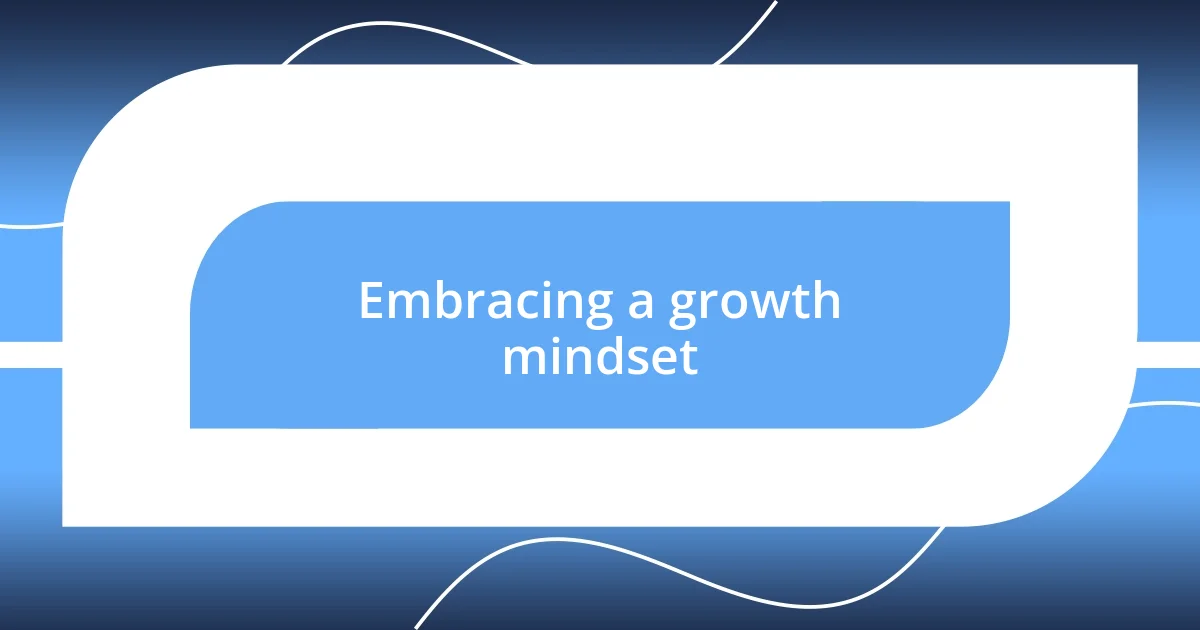
Embracing a growth mindset
Embracing a growth mindset has truly transformed my approach to rowing setbacks. I recall a moment when I realized that failure isn’t the end; it’s a stepping stone. During a particularly tough practice, I fell behind my teammates. However, instead of succumbing to defeat, I chose to analyze my mistakes openly. By discussing them with my coach, I shifted my perception from feeling inadequate to viewing each error as a learning opportunity. This shift in mindset has become empowering, allowing me to see setbacks not just as obstacles but as crucial lessons on my journey.
Here are some insights that helped me embrace this growth mindset:
- Mistakes are valuable: Each failure reveals where I can improve.
- Seek feedback: Engaging with coaches and teammates to discuss setbacks cultivates growth.
- Celebrate small victories: Recognizing progress, no matter how small, fuels motivation.
- Stay curious: Approaching challenges with curiosity rather than fear opens doors to new tactics and strategies.
- Reflect regularly: Taking time to think about my performance helps solidify lessons learned.
By nurturing this growth-oriented perspective, I’ve turned what once felt like stumbles into moments of profound learning and self-discovery. It’s all about relating to the process rather than merely focusing on the outcome.
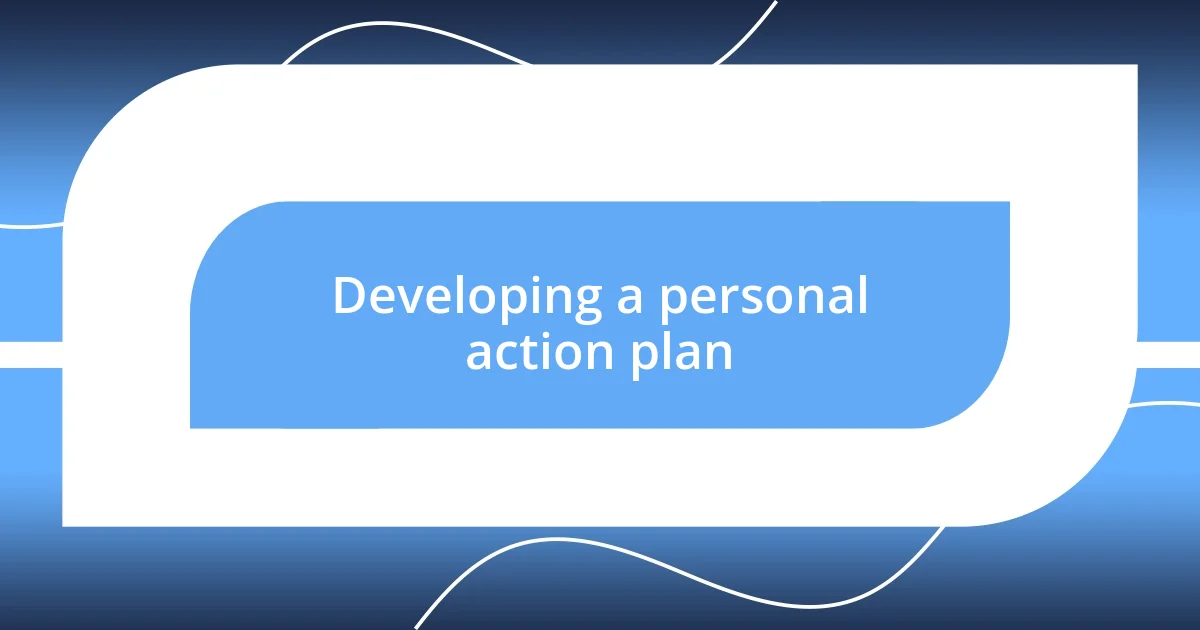
Developing a personal action plan
Creating a personal action plan has been a game-changer for me in navigating challenges in rowing. During a tough season, I made a commitment to outline specific, achievable goals. I began by setting short-term targets, like improving my stroke technique during practice. This made me feel in control, and each small win built my confidence, like putting the pieces of a puzzle together.
As I progressed, I realized the importance of flexibility within my plan. One day, after a particularly frustrating race, I felt disheartened. But instead of sticking rigidly to my original plan, I paused to reassess what I needed. Did I need extra drills, or was it time to focus on my mental game? Allowing for adjustments not only kept my motivation high but also taught me that growth isn’t always a straight line. It made me think—how often do we cling to a plan that no longer serves us?
Additionally, I found accountability partners in my teammates. We’d share our action plans and check in on each other’s progress. This sense of community transformed my individual journey into a shared experience. When setbacks occurred, we could remind each other of our goals and celebrate milestones together, reinforcing the feeling that we were all in this together—a revelation that made every small step feel monumental. Have you ever felt buoyed by sharing your challenges with others?

Seeking support from teammates
There have been countless times when I found myself struggling during practices or races. In those moments, I realized that my teammates were not just competitors; they were an invaluable source of emotional support. I remember one late afternoon, sitting on the dock after a less-than-ideal race, feeling defeated. My teammates gathered around, sharing their own setbacks and how they overcame them. That moment of vulnerability turned into a powerful bonding experience, reminding me that even the best athletes face challenges. How often do we underestimate the strength found in shared experiences?
As we trained together, our shared struggles became a language of camaraderie. I can still hear the voices of my teammates cheering me on when I wanted to give up during a grueling practice. One day, when I felt particularly drained, I expressed that feeling to the team. Instead of letting me wallow, they rallied around me, creating a mini-challenge that sparked a newfound energy in all of us. It’s incredible what encouragement can do—it’s like a fire ignited by collective motivation. Have you ever experienced that rush of energy from simply being part of a team?
This support also worked wonders for my mental resilience. I learned that reaching out for help didn’t make me weak; it showed strength in vulnerability. When I had an off day, I no longer hesitated to lean on a teammate who’d faced similar struggles. Sharing strategies and discussing our individual experiences made me feel less alone. In those conversations, I found clarity and solutions that I might not have discovered on my own. Isn’t it amazing how a simple conversation can shift your mindset and help you find a way forward?
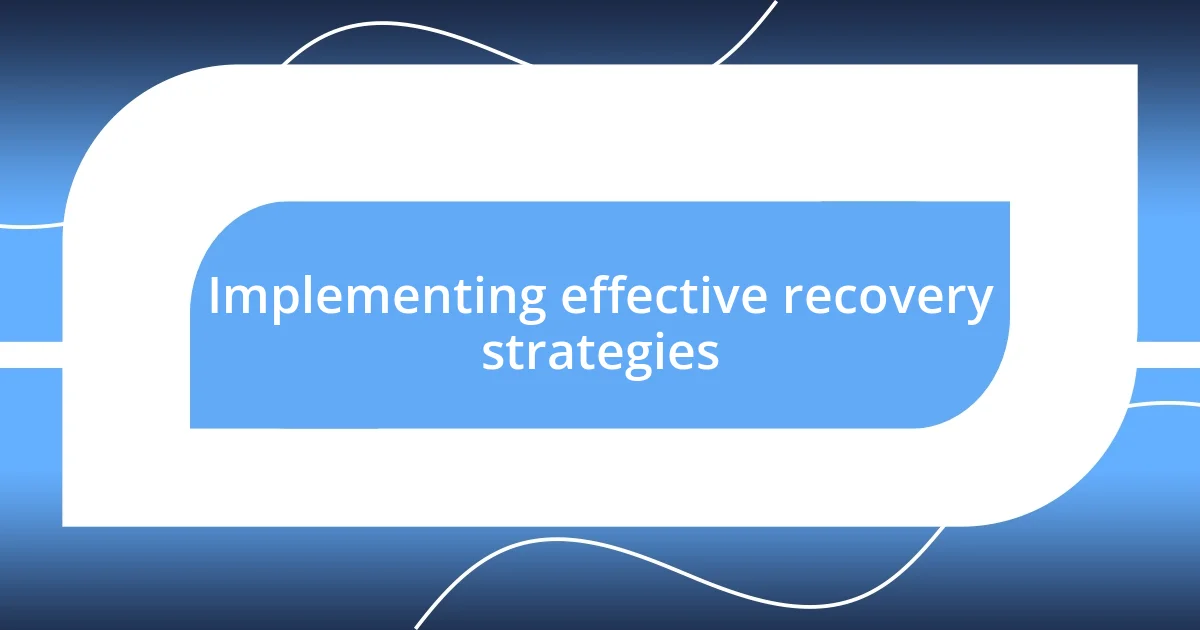
Implementing effective recovery strategies
Once I began to recognize the importance of recovery strategies, I found myself experimenting with different techniques. After an intense training session left me completely drained, I decided to try yoga. I remember lying on my mat, breathing deeply, and feeling my muscles slowly surrender. It was as if I had pressed a reset button, allowing both my body and mind to recharge. Have you ever felt the power of a good stretch turn around your day?
Along this journey, I also embraced the idea of active recovery days. Rather than being a couch potato on my rest days, I incorporated light activities like cycling or swimming. I vividly recall a Sunday morning when I chose to paddle in a kayak instead of my usual routine. The gentle flow of the water and the fresh air revitalized me, both physically and mentally. I marveled at how mixing things up kept my training fresh and made recovery feel like an enjoyable escape rather than a chore. Isn’t it incredible how a small change in routine can have such a big impact on your recovery?
Nutrition played a crucial role too. I started paying closer attention to my meals, focusing on foods that fuel recovery rather than just performance. One day, after a tough week of training, I whipped up a colorful smoothie packed with greens, protein, and antioxidants. The act of nourishing my body after pushing it to its limits became a ritual I genuinely looked forward to. It was more than just food; it felt like a gift I was giving myself. Do you prioritize what you eat after a workout, or is it something you overlook in the hustle?
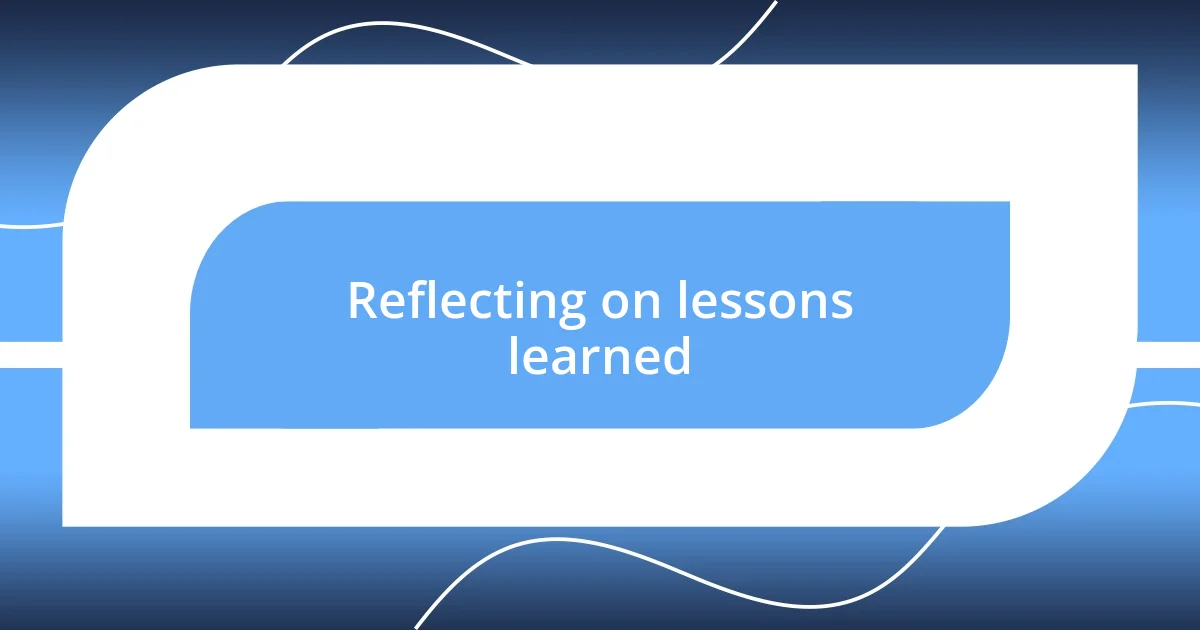
Reflecting on lessons learned
Reflecting on setbacks in rowing led me to a treasure trove of lessons. Each moment of struggle taught me not just about my limits but also about the profound growth that comes from pushing against them. I remember one particularly tough day when I crossed the finish line last. Instead of wallowing in disappointment, I took my time reflecting on what went wrong. This didn’t feel like defeat; it sparked a journey toward understanding and improvement. Have you ever turned a setback into a stepping stone?
With every setback, I learned to welcome discomfort as a catalyst for change. During a tough season where nothing seemed to go right, I found myself taking a long walk by the lake, processing my thoughts. The conversations with myself were raw and revealing. I realized that each setback had a lesson hidden in it, waiting for me to uncover it. It was in those moments of solitude that I truly understood the importance of resilience. Can you recall a moment of solitude that led you to a breakthrough?
These reflections shaped my mindset. By acknowledging my emotions—frustration, disappointment, and even anger—I found clarity. I began documenting my thoughts in a journal after each practice. Reading back through those pages, I could see patterns and areas for growth. It was, surprisingly, uplifting to witness my evolution. Is there a practice in your life that helps you transform your emotions into fuel for growth?














